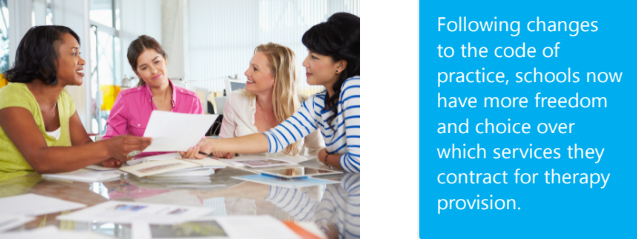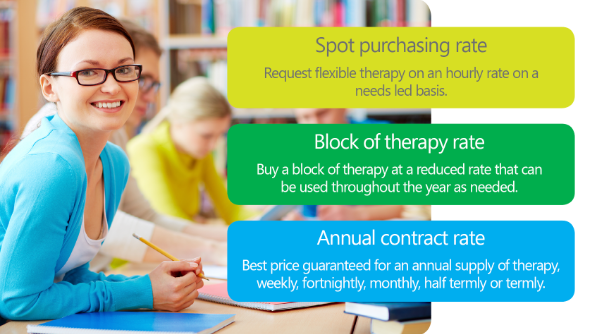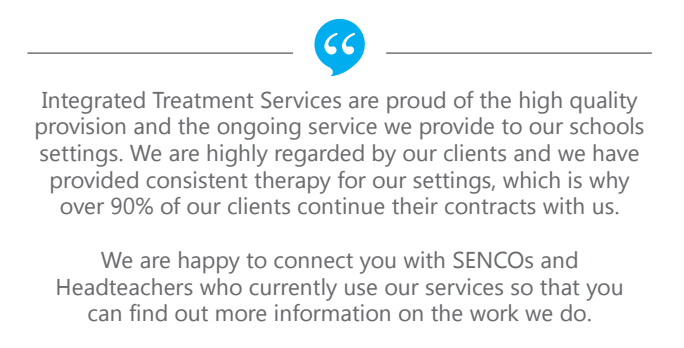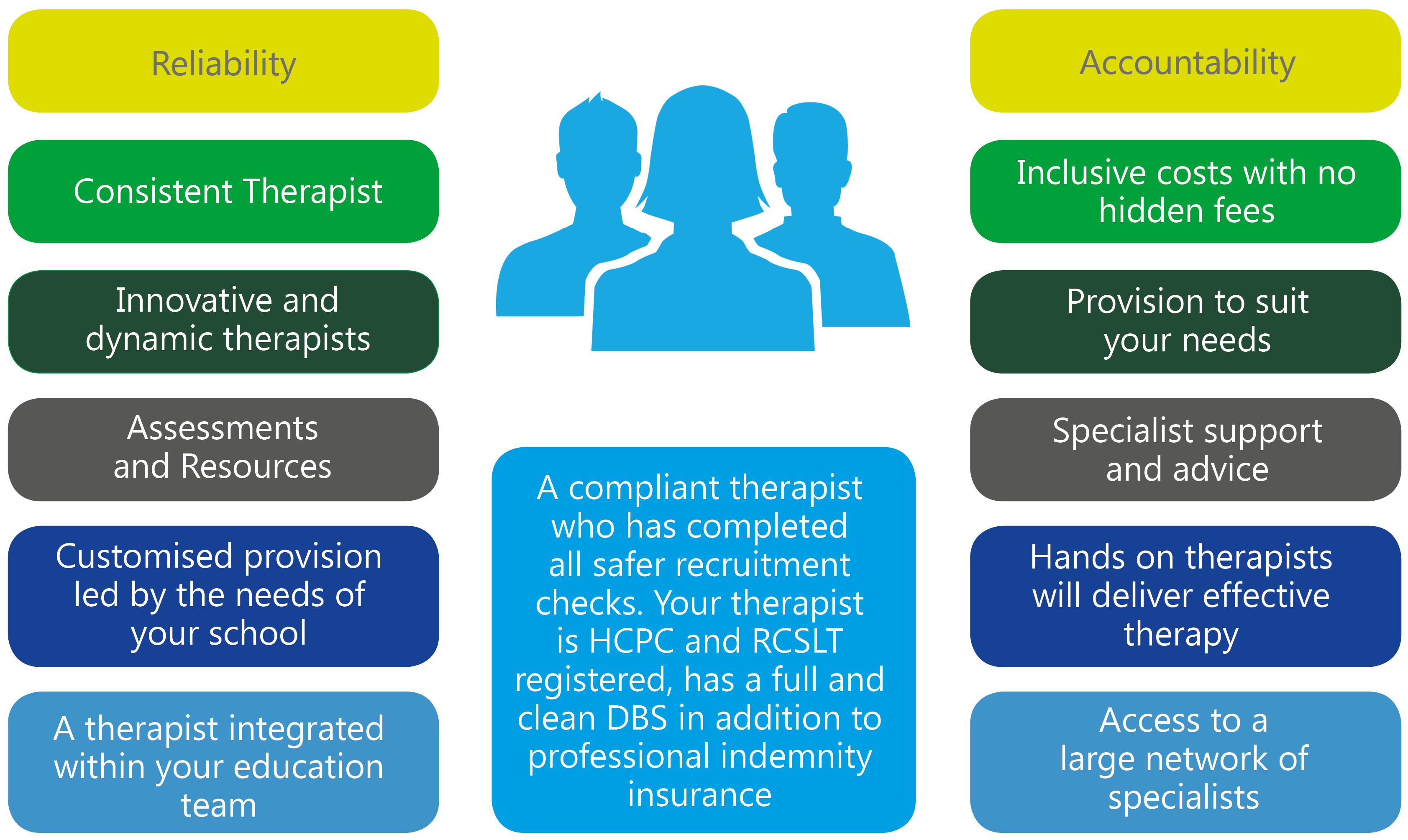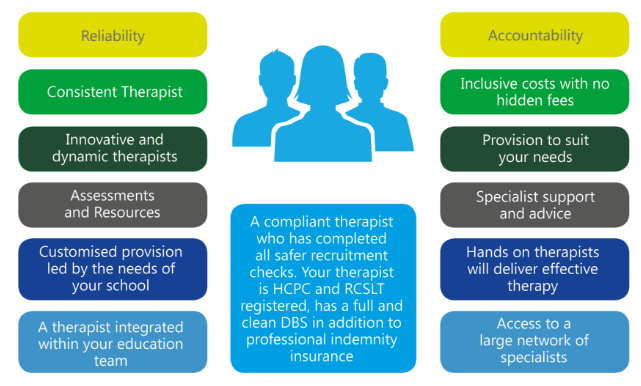Do your Core Speech and Language Therapy Services provide support for those children in your school without an EHCP?
Speech and language therapists are concerned that in some cases children and young people without EHC plans, who have a greater need and potential to benefit from speech and language therapy interventions, are now unable to access services.
As highlighted by the most recent RCSLT report (The SEND reforms in England, January 2017), the NHS provides core services for children with the highest level of Speech & Language therapy needs – but there is a significant group of children who: Enter school with delayed listening and language abilities (50% in some areas) or have persistent language and communication difficulties which impact on their learning, literacy and social communication (5 – 7%).

|
Below you will find details of the type of service you could buy from Integrated Treatment Services to support:
– A specific child: identify needs & targets, deliver a programme of therapy, evaluate progress.
– A group of children: Language Groups led by a trained TA, classroom projects.
– The whole school: Training and workshops for TA’s and teachers to develop skills in supporting children’s speech & language.
Currently Schools and Academies have the following options of
– Core Services of the NHS SLT provision to meet the speech and Language therapy needs of only those with an EHC plan.
– Traded services (either from the NHS or from Integrated Treatment Services) to meet the individual needs of those students without an EHC plan and to address your environmental communication needs, through group work, evidence based whole school approached and staff training.
|
The recent stats:
As many as 50% of all children in areas of social disadvantage are now entering school with delayed speech, language and communication skills and approximately 10% of children will have persistent, lifelong SLCN.
Undiagnosed or misunderstood communication difficulties can often be mistaken as behavioural problems, and if not effectively recognised and supported can have a huge impact on attainment levels, mental health, friendships, and employability.
Understanding the core NHS Commissioned Speech and Language Therapy Service offering:
NHS Commissioned Speech & Language Therapy services for Primary school-age children currently provide as a minimum:
– Open referral & initial assessment; on-going support for children with EHC Plans & Statements (part funded by the County Council).
– Therapy for children with speech sound disorders & stammers.
– Management of eating, swallowing & voice problems.
|
What are the NHS Speech and Language Therapy departments not able to provide; according to the latest RCSLT commissioned report?
RCSLT has found that provision of Speech & Language Therapy services to children without an EHCP is becoming harder for schools to obtain.
They list a number of actions they will take as an organisation to improve SLT access:
| “We are calling on the Department of Health, the Department for Education and the Department for Communities and Local Government to issue a joint ministerial circular which will provide clarity on, and reinforce, the responsibilities of local authorities, schools and Clinical Commissioning Groups (CCGs) to commission services for children without EHC plans.” |
| “In 2017, the RCSLT will work with the National Association of Head Teachers (NAHT) to develop advice and information for schools regarding how to support children with SLCN and how they can buy in speech and language therapy services directly.” |
RCSLT suggest:
“Alternative approaches to address the demand and manage the gap in resources, the service has explored alternative approaches: Working with local schools to explore options for commissioning speech and language therapy support for children and young people requiring targeted interventions. In one area, approximately half of schools commission additional speech and language therapy services for children and young people who do not have EHC plans.”
“Reviewed access criteria which now requires schools to provide additional information on children and young people with SLCN, for example, second language acquisition to reduce any unnecessary referrals.”
“Agreed relative roles and responsibilities of speech and language therapy as opposed to other support services, for example, teachers of the deaf, to reduce duplication of effort.”
“Offering training to school staff to increase their knowledge and skills in supporting children and young people with SLCN. Many schools have trained staff acting as coordinators and a resource for SLCN within the school. This has improved partnership working with SLTs and the support available to individual children and young people.
“Concerns remain that support for children and young people who do not have the protection of an EHC plan is inequitable and is influenced by the school he/she attends in that the quality and level of support implemented by schools varies as does their commissioning of speech and language therapy and other support services”
|
How much does it cost to buy in a therapist from Integrated Treatment services?
Speech and Language Therapy time can be purchased in a number of different ways.
The costs are based on the time that the therapist spends in the school working directly or indirectly to support children’s communication.
Indicative costs for the current Financial Year (2017 -2018) are set out below:

You can choose the experience band level of therapist to meet the presenting needs of your students and setting. If you are unsure of the level we can help guide you.
Activities can include, but are not limited to:
|
Sharing our services across a group of settings or a Teaching Alliance.
It is entirely possible to maximise your budget by joining together with other schools in your area. Sharing resources makes for greater use of SEN budgets:
– Attending reviews and meetings on a different day to which your SLT would normally work for you would be easier when a SLT is a shared resource across a group of schools for a full week.
– SLTS who can achieve a full time or part time post across a group of schools are far more likely to offer longer term commitment to their posts.
– Training sessions become more efficient and easier to schedule when shared across a group of schools.
– Adding to your therapy resource, creating a mini team and even training up your TAs as a SLTa adds an additional advantage when budget pooling.
You can still easily protect your own school’s budget with an itemised breakdown of contact for each school from our service.
The Integrated Treatment Services Team
The ITS team has established long term relationships with schools and Local Authorities.
Our therapists understand children’s speech and language development and the potential impact on communication.
They have close links with other Agencies – including IDS, Educational Psychology and other Health services;
They work closely with parents on how to support 24/7 therapy goals.
ITS as a service has a vast range of specialist SLT colleagues for each of our placed therapists to consult – ASD, Alternative & Augmentative Communication, Hearing Impairment, complex needs, eating & swallowing, stammering, cleft lip & palate, specific language impairment, acquired neurological problems, bi-lingualism specialists and selective mutism.
We also have a U.K. wide respected Specialist assessment centre for evaluating complex special educational needs using a full multidisciplinary team alongside parents and teaching/care staff.
Some of our schools already have a named NHS SLT providing the EHC provision, therefore with the support of RCSLT’s collaborative working guidelines, we can provide additional therapist/s specialising in school-aged children and the specific interventions you are looking to incorporate into your setting.
How could you use the additional time from the Speech & Language Therapist ?
(see Appendix 1 below for more detailed suggestions and specific programme breakdowns)
– Assessing a new student’s speech, language and communication needs and helping you to collate evidence to refer for an EHC plan.
– Reviewing a child’s speech, language and communication needs and setting up a programme of support
– Providing 1;1 evidence based therapy alongside key staff members and evaluating it’s effectiveness in a detailed impact report.
– Training a Teaching Assistant to set up and run a Language or Social Communication Group
– Twilight training & lNSET related to language, literacy and social skills
– Providing ‘drop in’ sessions for TA’s and/or teachers to problem solve, discuss strategies and differentiation for children’s communication needs.
– Supporting production of Speech and Language resources for use in school.
– Multi-agency planning and problem solving meetings.
– Parent ‘drop in’ sessions to talk about supporting talk, vocabulary, speech sounds and sharing stories at home.
– Providing Impact reports – to present evidence of intervention outcomes and weigh up spend verses children’s learning outcomes.
What are impact reports?
In the current climate it is more important than ever for schools and settings to show the impact therapy spend is having to improve SEN outcomes.
Our detailed impact reports will present clearly a detailed summary of the interventions and steps taken by both school, Therapist and the wider Multidisciplinary Team members alongside parents.
Effective reporting provides you key evidence to justify further actions such as an EHC plan, to show successes to OFSTED and governors / commissioners.
Do you know what you need?
Contact our dedicated Service Delivery Team to arrange a no obligation assessment of your current requirements and provision options.
Contact us about your therapy or training needs on info@integratedtreatments.co.uk or telephone us on 0845 8382921.
Appendix 1: What SLT intervention to choose:
Title: Review of Speech & Language Needs
Aim: To review child’s needs in school to determine:
- underlying language abilities
- strengths and potential
- demands of the classroom
- helpful strategies
- specific targets for IEP
- Recommend: specific SLT programme (if appropriate)
SLT’s in-school Activities:
observe in classroom , 1:1 assessment, discussion with key staff and parent, write notes
To follow visit: Written report, Communication Plan & programme
Estimated duration of in-school activity: 1 hour 30 mins to 2 hours
Frequency: X1 a term in combination with an SLT Programme update visit
Title: Direct Speech & Language Therapy
Aim: To review child’s progress against Programme targets and to refine Programme
- establish shared targets & identify key adults who will support
- demonstrate/explain
- share resources
- how is child responding?
- is programme practical and being followed in school?
- evaluate progress towards targets.
SLT’s in-school activities:
- 1:1 assessment of specific language/communication need with adult present
- demonstration of activities/strategies to key adult/s
- write notes
and/or attend IEP meeting.
To follow visit: Written Programme/Communication Plan
Estimated duration of in-school activity: 1 to 1 ½ hours
Frequency: X2 a term or X1 a term in combination with Review of Speech & Language Needs visit
Title: Language & Communication Groups
Aims: a) To develop child’s language and communication skills.
The primary focus of the group is one of the following:
- Listening
- Speech sound awareness for speech & literacy
- Auditory memory – ‘Mr Marvel’s Memory’
- Inference – ‘Picture Detectives’
- Stories- understanding and talking
- Social skills – ‘Let’s Talk’b) to develop skills and knowledge of Teaching Assistant:
- Baseline assessment & evaluate children’s progress
- Work with school Teaching Assistant with a group of up to 6 children in quiet space
- Provide group session plans or support TA in following published programme
- Model activities and therapy skills
To follow: Written Programme/Communication Plan with follow up ideas for school and home
Estimated duration of in-school activity: 1 hour (30-40 minutes group session with children).
Frequency: 8 sessions through a term. Typically SLT attends first three sessions & final session. TA to run other sessions independently
Title: 1:1 Therapy with child – carry over of skills into everyday situations
Aim: To develop the child’s speech and language skills in specific areas e.g. understanding concepts, vocabulary, word finding, sentence grammar
- establish shared targets & identify key adults who will support these
- face to face session with child with key adult present
- demonstrate/explain strategies and activities
- share resources
- establish how adults will support through the week
- evaluate progress towards targets
SLT’s in-school activities: Therapy with child (TA present), discussion with TA, face to face feedback to teacher & parent, write notes
To follow visit: Written Programme/Communication Plan with follow up ideas for school and home
Estimated duration of in-school activity: 1 hour (30-40 minutes session with child)
Frequency: Typically 6 sessions through a term – weekly or fortnightly
Do your Core Speech and Language Therapy Services provide support for those children in your school without an EHCP?
Speech and language therapists are concerned that in some cases children and young people without EHC plans who have a greater need and potential to benefit from speech and language therapy interventions are now unable to access services.
As highlighted by the most recent RCSLT report (The SEND reforms in England, January 2017), the NHS provides core services for children with the highest level of Speech & Language therapy needs – but there is a significant group of children who: Enter school with delayed listening and language abilities (50% in some areas) or have persistent language and communication difficulties which impact on their learning, literacy and social communication (5 – 7%).
“Children without an Education, Health and Care Plan are not getting the support that they need.”
In this brochure you will find details of the type of service you could buy from Integrated Treatment Services to support:
- A specific child: identify needs & targets, deliver a programme of therapy, evaluate progress.
- A group of children: Language Groups led by a trained TA, classroom projects.
- The whole school: Training and workshops for TA’s and teachers to develop skills in supporting children’s speech & language.
Currently Schools and Academies have the following options of
- Core Services of the NHS SLT provision to meet the speech and Language therapy needs of only those with an EHC plan.
- Traded services (either from the NHS or from Integrated Treatment Services) to meet the individual needs of those students without an EHC plan and to address your environmental communication needs, through group work, evidence based whole school approached and staff training.
By choosing to purchase a traded service, children in your setting will still be able to access the NHS core service and our team. We can also help identify children who are likely to meet the core service criteria and help you collate evidence as well as support the referral process.
The recent stats:
As many as 50% of all children in areas of social disadvantage are now entering school with delayed speech, language and communication skills and approximately 10% of children will have persistent, lifelong SLCN.
Undiagnosed or misunderstood communication difficulties can often be mistaken as behavioural problems, and if not effectively recognised and supported can have a huge impact on attainment levels, mental health, friendships, and employability.
Understanding the core NHS Commissioned Speech and Language Therapy Service offering:
NHS Commissioned Speech & Language Therapy services for Primary school-age children currently provide as a minimum:
- Open referral & initial assessment; on-going support for children with EHC Plans & Statements (part funded by the County Council).
- Therapy for children with speech sound disorders & stammers.
- Management of eating, swallowing & voice problems.
All schools have the autonomy to use any specialist provider they choose to add to the core service as long as they have the qualifications required. Many schools decide to outsource the obligatory first £6000 of their SEN provision with a carefully selected therapy provider.
What are the NHS Speech and Language Therapy departments not able to provide according to the latest RCSLT commissioned report?
RCSLT has found that provision of Speech & Language Therapy services to children without an EHCP is becoming harder for schools to obtain.
They list a number of actions they with take as an organisation to improve SLT access:
“We are calling on the Department of Health, the Department for Education and the Department for Communities and Local Government to issue a joint ministerial circular which will provide clarity on, and reinforce, the responsibilities of local authorities, schools and Clinical Commissioning Groups (CCGs) to commission services for children without EHC plans.”
“In 2017, the RCSLT will work with the National Association of Head Teachers (NAHT) to develop advice and information for schools regarding how to support children with SLCN and how they can buy in speech and language therapy services directly.”
RCSLT suggest:
“Alternative approaches to address the demand and manage the gap in resources, the service has explored alternative approaches: Working with local schools to explore options for commissioning speech and language therapy support for children and young people requiring targeted interventions. In one area, approximately half of schools commission additional speech and language therapy services for children and young people who do not have EHC plans.”
“Reviewed access criteria which now requires schools to provide additional information on children and young people with SLCN, for example, second language acquisition to reduce any unnecessary referrals.”
“Agreed relative roles and responsibilities of speech and language therapy as opposed to other support services, for example, teachers of the deaf, to reduce duplication of effort.”
“Offering training to school staff to increase their knowledge and skills in supporting children and young people with SLCN. Many schools have trained staff acting as coordinators and a resource for SLCN within the school. This has improved partnership working with SLTs and the support available to individual children and young people.
“Concerns remain that support for children and young people who do not have the protection of an EHC plan is inequitable and is influenced by the school he/she attends in that the quality and level of support implemented by schools varies as does their commissioning of speech and language therapy and other support services”
“Schools which turn the dial on language and communication are able to turn the dial on a number of key school improvement priorities, from raising attainment to narrowing the gap and improving behaviour”
(Jean Gross, Communication Champion, 2011)
How much does it cost to buy in a therapist from Integrated Treatment services?
Speech and Language Therapy time can be purchased in a number of different ways.
The costs are based on the time that the therapist spends in the school working directly or indirectly to support children’s communication.
Indicative costs for the current Financial Year are set out below:
| Experience Band | ½ day | Full day |
| Band 5 NQP SLT | £220 | £385 |
| Band 6 SLT | £260 | £455 |
| Band 7 SLT | £300 | £525 |
You can choose the experience band level of therapist to meet the presenting needs of your students and setting. If you are unsure of the level we can help guide you.
Therapy Activities can include:
- Observation of child in the classroom/playground
- Face to face with child with key adult present
- Discussion with school staff
- Meeting with parent/carers
- Planning and review meetings
- Training school staff (Specific on site staff training can also be purchased. Details can be found on other pages in this brochure).
Sharing our services across a group of settings or a Teaching Alliance.
It is entirely possible to maximise your budget by joining together with other schools in your area.
Sharing resources makes for greater use of SEN budgets:
– Attending reviews and meetings on a different day to which your SLT would normally work for you would be easier when a SLT is a shared resource across a group of schools for a full week.
– SLTS who can achieve a full time or part time post across a group schools are far more likely to offer longer term commitment to their posts.
– Training sessions become more efficient and easier to schedule when shared across a group of schools.
– Adding to your therapy resource, creating a mini team and even training up your TAs as a SLTa adds an additional advantage when budget pooling.
You can still easily protect your own school’s budget with an itemised breakdown of contact for each school from our service
The Integrated Treatment Services Team
The ITS team has established long term relationships with schools and Local Authorities.
Some of our schools already have a named NHS SLT providing the EHC provision, therefore with the support of RCSLT’s collaborative working guidelines, we can provide additional therapist/s specialising in school-aged children and the specific interventions you are looking to incorporate into your setting.
Our therapists understand children’s speech and language development and the potential impact on communication.
They have close links with other Agencies – including IDS, Educational Psychology and other Health services;
They work closely with parents on how to support 24/7 therapy goals.
ITS as a service has a vast range of specialist SLT colleagues for each of our placed therapists to consult – ASD, Alternative & Augmentative Communication, Hearing Impairment, complex needs, eating & swallowing, stammering, cleft lip & palate, specific language impairment, acquired neurological problems, bi-lingualism specialists and selective mutism.
We also have a U.K. wide respected Specialist assessment centre for evaluating complex special educational needs using a full multidisciplinary team alongside parents and teaching/care staff.
How could you use the additional time from the Speech & Language Therapist ? (email us info@integratedtreatments.co.uk for more detailed suggestions and specific programme breakdowns)
– Assessing a new students speech, language and communication needs and helping you to collate evidence to refer for an EHC plan.
– Reviewing a child’s speech, language and communication needs and setting up a programme of support
– Providing 1;1 evidence based therapy alongside key staff members and evaluating it’s effectiveness in a detailed impact report.
– Training a Teaching Assistant to set up and run a Language or Social Communication Group
– Twilight training & lNSET related to language, literacy and social skills
– Providing ‘drop in’ sessions for TA’s and/or teachers to problem solve, discuss strategies and differentiation for children’s communication needs.
– Supporting production of Speech and Language resources for use in school.
– Multi-agency planning and problem solving meetings.
– Parent ‘drop in’ sessions to talk about supporting talk, vocabulary, speech sounds and sharing stories at home.
– Providing Impact reports – to present evidence of intervention outcomes and weigh up spend verses children’s learning outcomes.
What are impact reports?
In the current climate it is more important than ever for schools and settings to show the impact therapy spend is having to improve SEN outcomes.
Our detailed impact reports will present clearly a detailed summary of the interventions and steps taken by both school, Therapist and the wider Multidisciplinary Team members alongside parents.
Effective reporting provides you key evidence to justify further actions such as an EHC plan, to show successes to OFSTED and governors / commissioners.
Do you know what you need?
Contact our dedicated Service Delivery Team to arrange a no obligation assessment of your current requirements and provision options.
Contact us about your therapy or training needs on info@integratedtreatments.co.uk or telephone us on 0845 8382921.

